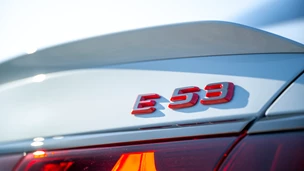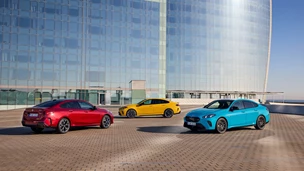Despite a trend towards all things SUV-shaped in the new car market, the humble family hatchback remains a very lucrative staple for car manufacturers; the Volkswagen Golf, Ford Focus, Vauxhall Astra and Audi A3 all placed in the top ten best selling cars in the UK in 2014. The new Peugeot 308 was good enough to receive the prestigious European Car of the Year title last year, but alas not good enough to crack the top ten.
So to broaden its appeal, plus stoke a bit of interest in the forthcoming range-topping 308 GTI (possibly called 308 R, the name of the concept car Peugeot showed at the 2014 Frankfurt Motor Show), the French company has created a pair of warmed up GT versions – one petrol, one diesel. It’s also created a new GT Line trim, aesthetically aping the GT cars but with lesser engines.
Performance
There are two engines powering the 308 GT, two transmission options, and two body styles. However, two plus two plus two equals three, because with the five-door hatchback GT the diesel is automatic-only and the petrol a six-speed manual only, while the SW estate body style comes with that diesel-auto combination alone; Peugeot would sell so few petrol estates that it’s not really worth bothering.
The petrol is a 1.6-litre turbocharged unit with 202bhp, and the diesel a 2.0-litre turbo with 178bhp. Intriguingly, it’s the latter of those that adheres to convention in the class, because 178bhp is about standard for a mid-level diesel hot hatch.
The petrol, by contrast, operates in an emerging niche of 200bhp-ish petrol-powered warm hatches, with really only the Kia cee’d GT for company. The Golf GTI, Ford Focus ST and Skoda Octavia vRS all have 217bhp or more, while SEAT’s 262bhp Leon Cupra is in another league altogether.
Nonetheless, both the petrol and diesel 208 GTs feel quick (0-62mph in 7.5 seconds for the former, 8.4 seconds the latter), but it’s actually the diesel’s enormous 400Nm torque swell that in some ways makes it the more satisfying of the two – and certainly the more flexible in-gear. It also suits the GT’s distinctly non-raucous, fairly restrained overall character better, particularly as it’s auto-only.
A quick but significant footnote is that all GT cars come with an utterly transformative sound actuator, switched on with the Sport button. It’s completely shameless, piping an incongruous roar akin to an American V8 through the stereo speakers, but it’s a bit of fun in what is otherwise a relatively sensible sporty hatchback.
Ride and Handling
Peugeot has resisted the urge to make the ride harsher than a Katie Hopkins snipe, but has lowered the suspension by 10mm at the back and 7mm at the front, and stiffened the springs slightly.
The 308 GT’s steering wheel is unusually small, as per the rest of the 308 range, but it makes more sense here in a car with dynamic pretensions. Thick-rimmed and moulded to suit good old ‘nine and three o’clock’ hand placement, it’s linked to a steering rack that’s impressively quick to turn the car in. For that reason the 308 feels agile, especially in Sport mode, which removes some of the power assistance. Peugeot has resisted the urge to make the ride harsher than a Katie Hopkins snipe, but has lowered the suspension by 10mm at the back and 7mm at the front, and stiffened the springs slightly. The result is a car that does jiggle a little too much at lower speeds on less-than-perfect surfaces, but ordinarily retains a well-contained, near-relaxing ride quality – especially on the motorway. Ultimately, this is a car pitched somewhere between comfortable and sporty that ends up excelling in neither one nor the other. That’s not necessarily a bad thing though, because there’s enough dynamic ability to satiate those looking for the occasionally engaging driving experience, without upsetting the backsides of the majority who just want to get from point A to point B in relatively quick and fuss-free fashion.
Interior and Equipment
It’s not official yet, but it’s widely expected that the very well received 266bhp drivetrain of the Peugeot RCZ R will be transplanted into the 308 to create a GTI version. The 308 GT is the warm-up act.
The cabin is a neat, pleasant and largely soft-touch place to be (although the small steering wheel and elevated instrument cluster still seem needlessly ergonomically awkward), and GT specification is positively all-encompassing. The kit includes 18-inch (and highly ornate) alloy wheels, LED indicators that sweep theatrically rather than blink, leather steering wheel and gear shifter and Alcantara and leather sports seats. The 308 GT also has red accent stitching woven throughout, dual-zone air conditioning and a gloriously high resolution touchscreen sat-nav and multi-media system. It’s as practical as you’d expect – no Skoda Octavia in terms of outright space, but a notable improvement in headroom and leg space at the back over its predecessor – and the SW estate version has an 810-litre boot that stretches to 1,775 litres. To give those numbers meaning, the Volkswagen Golf Estate offers a space 605- to 1,620 litres, making it a bedsit to Peugeot’s open plan studio apartment.
Cost
Fuel consumption and emissions from the Euro 6 qualifying engines are as you’d expect: 50.4mpg and 130g/km from the petrol and a much more impressive 70.6mpg and 103g/km from the diesel.
Peugeot’s sales went down in 2014, the result, so the company told us, of a deliberate strategy to reduce the number of bargain basement, high-volume fleet deals on this new 308; the preceding 308 suffered from terrible residuals because so many were flogged off to rental companies for cheap. We’re telling you that because it also explains why the Peugeot looks expensive next to its main rivals – the company wants to sell the car on its technological and interior quality merits, rather than piling them high and… you know the rest. Fuel consumption and emissions from the Euro 6 qualifying engines are as you’d expect: 50.4mpg and 130g/km from the petrol and a much more impressive 70.6mpg and 103g/km from the diesel. The problem is, it just looks a bit too expensive. At £24,095 for the petrol manual five-door, rising to £26,846 for the diesel SW, it’s more up front than, say, the Kia cee’d GT Tech edition, and it surpasses the more powerful Skoda Octavia vRS like-for-like too. We’d suggest it’s those two cars that will prove the thorn in the side of Peugeot salesman, because the Kia can play the value card more effectively, while the Skoda is simply the more engrossing car.
Our Verdict
The Peugeot 308 GT is quick, comfortable, good looking and high quality, but it just doesn’t stand out in any one area – and nor, quite, does it stack up financially. It’s hard to criticise, but it’s also hard to clearly recommend above the ream of very capable competitors. We’d suggest that if you like the look of the 308, get your GT fix with the lower powered and more cost-effective GT Line versions. Or wait for the GTI. That’ll be one to watch.




